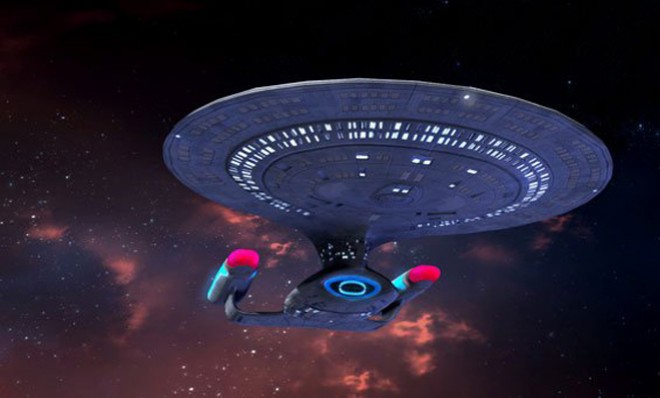Star Trek Into Darkness: 5 theories on what the official plot synopsis really means
Trekkies are reading a lot into the seemingly spare plot summary of the new Star Trek sequel — foreseeing the deaths of major characters and the return of an old villain


A free daily email with the biggest news stories of the day – and the best features from TheWeek.com
You are now subscribed
Your newsletter sign-up was successful
After months of teasing, Paramount has thrown eager Trekkies the world over a small bone by releasing an official plot synopsis of the upcoming Star Trek Into Darkness — the sequel to J.J. Abrams' popular 2009 Star Trek reboot — which is scheduled for release on May 17, 2013:
"When the crew of the Enterprise is called back home, they find an unstoppable force of terror from within their own organization has detonated the fleet and everything it stands for, leaving our world in a state of crisis. With a personal score to settle, Captain Kirk leads a manhunt to a war-zone world to capture a one-man weapon of mass destruction. As our heroes are propelled into an epic chess game of life and death, love will be challenged, friendships will be torn apart, and sacrifices must be made for the only family Kirk has left: his crew."
Though sketchy, this synopsis is still the most detailed statement that Paramount has released to date about the Star Trek sequel; fans are still waiting for a teaser trailer and specifics on the casting of Benedict Cumberbatch, who's slated to play a "villain." But as with all things Star Trek, the information blackout hasn't stopped fans from wildly speculating on the plot of Into Darkness. Here, 5 theories on what the official synopsis really tells us:
The Week
Escape your echo chamber. Get the facts behind the news, plus analysis from multiple perspectives.

Sign up for The Week's Free Newsletters
From our morning news briefing to a weekly Good News Newsletter, get the best of The Week delivered directly to your inbox.
From our morning news briefing to a weekly Good News Newsletter, get the best of The Week delivered directly to your inbox.
1. Captain Kirk's mother will be killed
This synopsis offers at least one legitimate hint, says Ben Moore at ScreenRant. Captain Kirk's mother, who appeared in the 2009 Star Trek reboot, "will probably be killed" by the "unstoppable force of terror described," since the outline goes on to call Kirk's crew "the only family he has left."
2. And Spock may be killed off too
The Star Trek reboot took great pains to pay homage to the original series, says Get the Big Picture, and, if its sequel follows suit, we may see the death of Zachary Quinto's Spock. After all, "Spock bit the dust in Wrath of Khan," the 1982 sequel to the original Star Trek: The Motion Picture, and Quinto recently commented that he doesn't want to come back for another Star Trek film.
A free daily email with the biggest news stories of the day – and the best features from TheWeek.com
3. The "unstoppable force of terror" is iconic Star Trek villain Khan
Even before Sherlock star Benedict Cumberbatch was cast as the to-be-announced antagonist, fans were speculating that the sequel's villain would be none other than classic Star Trek baddie Khan Noonien Singh, originally played by Ricardo Montalbon, says AceShowbiz. And though Paramount is staying mum, a "one-man weapon of mass destruction" sounds exactly like Khan.
4. No, the villain is original series character Gary Mitchell
Forget Khan and look more carefully at the synopsis' declaration that the Enterprise crew is being attacked by one "within their own organization," says Terri Schwartz at Zap2It. That points directly to Gary Mitchell, a villain from the original Star Trek episode "Where No Man Has Gone Before," in which Mitchell, an old friend and comrade of Captain Kirk, develops telepathy and telekinesis, eventually declaring himself a god and forcing Kirk to kill him. That tragic arc is ideal for adaptation to the big screen.
5. The sequel might just feature a literal "epic chess game"
Who cares about major character deaths or mysterious arch-villains? Let's talk about that "epic chess game," says Matt Patches at Hollywood.com. Yes, the phrase is probably a metaphor — but then again, they pulled off a literal "epic chess game" in Harry Potter and the Sorcerer's Stone, so why shouldn't Star Trek follow suit? Maybe it's Tri-Dimensional Chess, offers Ali Plumb at Empire Online. After all, Star Trek Into Darkness is going to be released in 3D.
Scott Meslow is the entertainment editor for TheWeek.com. He has written about film and television at publications including The Atlantic, POLITICO Magazine, and Vulture.
